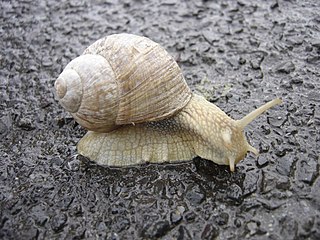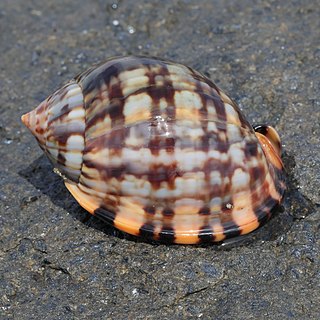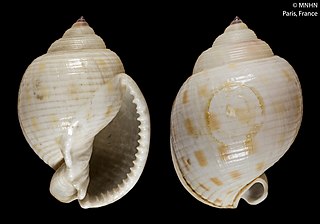
A snail is a shelled gastropod. The name is most often applied to land snails, terrestrial pulmonate gastropod molluscs. However, the common name snail is also used for most of the members of the molluscan class Gastropoda that have a coiled shell that is large enough for the animal to retract completely into. When the word "snail" is used in this most general sense, it includes not just land snails but also numerous species of sea snails and freshwater snails. Gastropods that naturally lack a shell, or have only an internal shell, are mostly called slugs, and land snails that have only a very small shell are often called semi-slugs.

Sea slug is a common name for some marine invertebrates with varying levels of resemblance to terrestrial slugs. Most creatures known as sea slugs are gastropods, i.e. they are sea snails that over evolutionary time have either completely lost their shells, or have seemingly lost their shells due to having a greatly reduced or internal shell. The name "sea slug" is most often applied to nudibranchs, as well as to a paraphyletic set of other marine gastropods without obvious shells.

Sea snail is a common name for slow-moving marine gastropod molluscs, usually with visible external shells, such as whelk or abalone. They share the taxonomic class Gastropoda with slugs, which are distinguished from snails primarily by the absence of a visible shell.

The Scotch bonnet is a medium-sized to large species of sea snail, a marine gastropod mollusk in the subfamily Cassinae, the helmet shells and bonnet shells. The common name "Scotch bonnet" alludes to the general outline and color pattern of the shell, which vaguely resemble a tam o' shanter, a traditional Scottish bonnet or cap. The shell is egg-shaped and fairly large, 2 to 4 inches in maximum dimension, with a regular pattern of yellow, orange or brown squarish spots. The surface sculpture of the shell is highly variable: the surface can be smooth and polished, have grooves, be granulated, or even be nodulose on the shoulder of the whorls.

The Cassidae are a taxonomic family of medium-sized, large, and sometimes very large sea snails commonly called helmet snails or bonnet snails. These are marine gastropod mollusks in the superfamily Tonnoidea and the clade Littorinimorpha.

Semicassis pyrum, common name the "pear bonnet" or "common helmet", is a species of large sea snail, a marine gastropod mollusc in the family Cassidae, the helmet shells, bonnet shells and their allies.

Semicassis labiata is a species of large predatory sea snail, a marine gastropod mollusc. This species is in the subfamily Cassinae, the "helmet shells" and "bonnet shells", which feed on sea urchins.

Phalium bandatum, common name the banded bonnet, is a species of sea snail, a marine gastropod mollusk in the family Cassidae.

Phalium areola, common name the checkerboard bonnet, is a species of sea snail, a marine gastropod mollusc in the subfamily Cassinae, within the family Cassidae the helmet and bonnet shells. It is also known as the checkerboard bonnet shell.

Cassis flammea is a species of large sea snail, a marine gastropod mollusk in the family Cassidae, the helmet snails and bonnet snails.

Cypraecassis testiculus, common name the reticulated cowry helmet, is a species of large sea snail, a marine gastropod mollusk in the family Cassidae, the helmet snails and bonnet snails.

Galeodea echinophora, the spiny bonnet or helmet shell, is a species of large sea snail, a marine gastropod mollusk in the family Cassidae, the helmet snails and bonnet snails.

Galeodea rugosa, common name : the rugose bonnet, is a species of large sea snail, a marine gastropod mollusk in the family Cassidae, the helmet snails and bonnet snails.

Semicassis bisulcata, common name: the Japanese bonnet, is a species of large sea snail, a marine gastropod mollusk in the family Cassidae, the helmet snails and bonnet snails.

Phalium faurotis is a species of large sea snail, a marine gastropod mollusk in the family Cassidae, the helmet snails and bonnet snails.

Phalium fimbria is a species of large sea snail, a marine gastropod mollusk in the family Cassidae, the helmet snails and bonnet snails.

Phalium glaucum, common name the grey bonnet or glaucus bonnet, is a species of large sea snail, a marine gastropod mollusk in the family Cassidae, the helmet snails and bonnet snails.

Sconsia grayi is a species of large sea snail, a marine gastropod mollusk in the family Cassidae, the helmet snails and bonnet snails.

Phalium, common name the bonnet shells, is a genus of large sea snails, marine gastropod molluscs in the subfamily Phaliinae of the family Cassidae, the helmet shells, bonnet shells and their allies.

Semicassis saburon is a species of large sea snail, a marine gastropod mollusc in the family Cassidae, the helmet snails and bonnet snails.



















